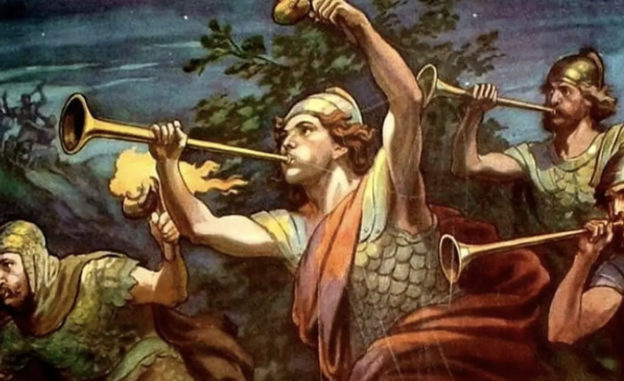What skills and attributes do you need to serve God? Does God only call people who meet certain standards to serve and honour him? While God does set standards for those he calls to Eldership or the Diaconate, in general God calls us despite our sinful inadequacy to serve and enjoy peace with him.
In Judges 6:11-24, God calls Gideon to lead Israel in throwing off their Midianite oppressors. God approaches Gideon in his weakness, commissions Gideon with a promise, and assures Gideon with a sign. Gideon realises the heights of God’s holiness and the terror of his inadequacy, but experiences the peace with God that ultimately comes to us all through Jesus.
The first ten verses of chapter six establish the need for another Judge to lead God’s People in driving out their oppressors. The Midianites are like locusts on the land, taking all the food and resources and leaving the Israelites impoverished and hiding their crops to have something to eat.
It is in that context that God approaches Gideon in his weakness. Gideon, like the rest of God’s People, are fearful of the Midianites and their locust-like ways. Gideon “was beating out wheat in the winepress to hide it from the Midianites” (v.11), which is not the standard way of beating out wheat.
Normally, to separate the wheat from the chaff, large open spaces were used to allow the wind to carry away the chaff. Gideon instead is hiding his wheat in a winepress (which is designed to not let contents escape), to avoid detection.
As Gideon was hiding his wheat in the winepress, “the angel of the LORD came and sat under the terebinth at Ophrah” (v.11) which belonged to Gideon’s father, and announced to fearful Gideon “The LORD is with you, O mighty man of valour” (v.12). God declared Gideon a man of valour, because God was with him.
Gideon responded by asking why, if God was with Israel (not just him), then why were the Midianites oppressing them (v.13)? God had already answered this question when he sent the prophet to Israel (vv.8-10).
As this question from Gideon missed God’s point, and had already been answered anyway, the passage moves to God commissioning Gideon with a promise. This promise was already given in verse 12, it is repeated again.
“Go in this might of yours and save Israel from the hand of Midian; do not I send you?” (v.14). God would specifically be with Gideon. Specifically to save Israel. God was sending Gideon.
Gideon’s response showed his hesitancy to step into the role God was commissioning him to. He questions how he could be Israel’s saviour, given he was the youngest son of the weakest clan of Manasseh (v.15).
God’s response emphasises his adequacy in Gideon’s inadequacy. “I will be with you, and you shall strike the Midianites as one man” (v.16). Just as with Moses (Exodus 3) and Joshua (Josh. 1) before, God would empower a reluctant leader to serve him.
Despite this promise of sufficiency in God, Gideon wanted a sign (v.17). He wanted to know that the promise was truly from God. So God assured Gideon with a sign.
The angel of God waited as Gideon prepared a meal for him, a process which would have taken some time (vv.18-9). Then, Gideon followed instructions to lay these on a rock, with the broth poured over (v.20). Would God accept the offering?
The answer was yes, as the angel’s staff touched the rock, which erupted with flame and turned the dampened meat and bread into cinders! At the same time, Gideon’s visitor vanished (v.21).
Only at this point did Gideon realise that the messenger was not just from God, but was God. This realisation brought fear, not assurance (v.22).
Despite this, God followed up his sign with words of comfort to Gideon. God spoke to Gideon from the sky, telling him “Peace be to you. Do not fear; you shall not die” (v.23). Gideon accepted his commission, rested in this assurance, and built an altar there that spoke of the peace which comes from God (v.24).
While Gideon’s response of terror might seem odd to us, it reflects his view of God’s holiness which we forget or downplay today. God’s holiness is awe inspiring. It causes terror, it caused grown men to faint (Daniel 10, Revelation 1:17).
It is only as we grasp God’s holiness and our sinfulness that we can truly grasp the wonder of peace with God. God’s mercy is so great because his holiness is so great. His forgiveness and grace are so amazing because of how far we fall short of his glory.
This peace was available to men like Moses, Joshua, and Gideon, because of Christ’s holiness. Christ’s holiness given to us, and our sinfulness paid for by his death on the Cross, is the reason we have peace with God. It is the reason that, like Gideon before us, our inadequacy is made more than adequate to serve God.


